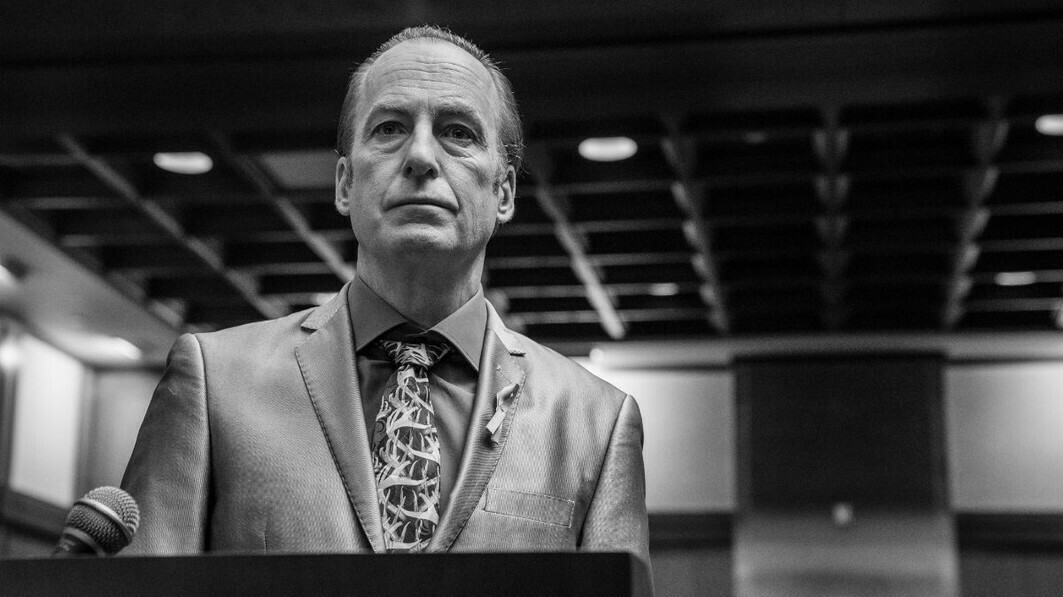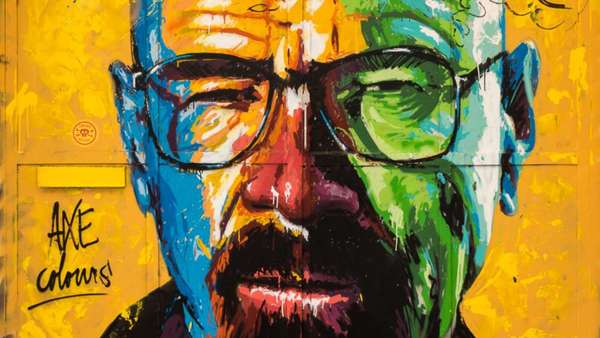SPOILER ALERT: Spoilers follow immediately below.
In the final episode of Better Call Saul, there is a flashback with Mike Ehrmantraut and Saul Goodman in the desert as they are transporting seven million dollars of bail money for Lalo Salamanca. They come across a cistern full of water. After Saul laps it up, they sit and Saul finds it a good time for a conversation. Saul proposes that with the money they spend six million to build a time machine, and then split the rest to go back in time. Saul asks to what time Mike would go back. “1984,” Mike responds. The time he took his first bribe. Saul’s answer is 1965: the year Warren Buffet takes over Berkskire Hathaway. He would invest his half right then, and today be a billionaire. Is there such a thing as a trillionaire? Perturbed, Mike says, “Money? That’s it . . . . There’s nothing you’d change?” They keep walking.
Herein lies the central dilemma of Jimmy McGill’s life: what does he want? It is displayed in his name change: his birth name of Jimmy McGill, which ties him to the legacy of his brother, or Saul Goodman, the expert con artist and money grabber. He was best when he was bad.
Desire, or passion, is not as simple as a dualistic split between good and evil. There are a variety of disordered desires pulling at the will. One can choose good things that are not ultimate things and still will unwisely. Or one can enjoy a good thing that is not made to be enjoyed, and the result is restlessness. When the will functions by what it loves most, and it loves disorderly, the will ends up pushed and pulled in different directions. Rather than rightly loving in unity, the will becomes entangled in a myriad of false pursuits. St. Augustine writes, “You [God] gathered me together from the state of disintegration in which I had been fruitlessly divided. I turned from unity in you to be lost in multiplicity.”[1] Augustine is describing a myriad of false choices that result in division. Whereas rightly ordered loving unifies the will and the self, disordered desire and subsequent choices divide the self. So, Augustine suggests that he has himself to blame for his disintegration. It is not some alien force that sins in us; rather, “the whole was myself and what divided me against myself was my impiety.”[2] Seeking a unified rest of a happy life, a person disintegrates in their false pursuits if not rightly ordered.
In a similar way, Jimmy McGill is pulled in different directions and ends up divided. It is not as if he has one right and holy way to live, and one obviously destructive way. Disorder runs rampant as Jimmy discovers who he is and what he desires. Desire is tied to his name and the name he takes, and to the consequences of his desires and names.
Who is Jimmy McGill?
Underneath Jimmy’s presentation to the world, there is a deeper motive that twists in Jimmy: to please his brother, Chuck. In the second episode of Season 1, Jimmy finds himself in a jail cell ready to sweet talk himself out of his predicament through his brother, Chuck—business as usual for “slipping Jimmy.” But he comes to the end of himself. If he does not get help, his life is over. Chuck provides a moment of grace. And Jimmy is indebted. He will make a change. He meets his huckster friend, Marco, to say goodbye. He knows he was dead to rights, but he was bailed out by his brother. And like any true moment of grace, he knows that it is time to make changes. Marco reminds Jimmy: “You’re slipping Jimmy. It’s who you are!” (s1e10). Jimmy thinks he can change. He can make Chuck proud of him. It is this question of identity that plagues Jimmy. He wants to be an honorable lawyer, but perhaps he is only a fraud.
Crisis leads to the discovery of the real Jimmy McGill. At the end of the first season, Jimmy finds out Chuck has been hindering him from working at the law firm of Hamlin, Hamlin, and McGill. Jimmy thought his brother was proud, and he was. But his brother confesses that he knows who Jimmy is: “You’re still ‘slipping Jimmy’ with a law degree” (s1e10). Much of the series goes on to display this conflict between Jimmy and his older brother as Jimmy tries to change—and discover—who he is.
Towards the end of the series, Jimmy and his brother are in a law room to prove that Jimmy has been disqualified from the law profession by attacking Chuck. Jimmy plants a battery on his brother to prove that Chuck is mentally unfit (thinking himself allergic to electricity). Chuck exclaims:
You think this is something? You think this is bad? This? This chicanery? He’s done worse. That billboard! Are you telling me that a man just happens to fall like that? No! He orchestrated it! Jimmy! He defecated through a sunroof! And I saved him! And I shouldn’t have. I took him into my own firm! What was I thinking? He’ll never change. He’ll never change! Ever since he was nine, always the same! Couldn’t keep his hands out of the cash drawer! But not our Jimmy! Couldn’t be precious Jimmy! Stealing them blind! And he gets to be a lawyer? What a sick joke! I should’ve stopped him when I had the chance! (s3e5).
This outburst from the controlled and distinguished Charles McGill works. Jimmy proves to the court that his elder brother is mentally unstable.
Later, Jimmy goes to Chuck’s house to apologize for his antics. He wishes he could do things differently. Chuck responds, “Why? It’s what you do. You hurt everyone around you. You won’t change . . . I don’t want to hurt your feelings. But you’ve never mattered that much to me” (s3e10). These words ring with expected pain in Jimmy’s ears. He has tried to restore his name but to no avail. He wanted to make his brother proud, and it never made any difference. Jimmy takes on the name given to him by his brother: “Slipping Jimmy.” This moment defines how he will see himself.
Jimmy ends up being suspended by the Bar association, but he goes back to be reinstated a year later. He waxes eloquently about how he has changed and what he hopes to pursue in the future. He thinks he has won them over. But the bar rejects his application for “being insincere.” Jimmy becomes incensed. However, the show beckons and Jimmy must answer: is he sincerely good?
Jimmy McGill does not make the same mistake the second time around at the reinstatement trial. The answer that tripped him the first time was a question regarding his estranged—and now dead—brother. Jimmy begins to read a note from Chuck—a sort of last will and testament to his kid brother. He stops after a few sentences, confessing that he wanted to pull on the heartstrings of the committee. All his life he wanted to make his brother proud, Jimmy says. And it was a hard task. He goes through the trials of attempting to live up to the name, “McGill.” “But I can try,” he says choking back tears (s4e10). His honesty even moves Kim, who wipes away tears from her eyes. Maybe he will take the honorable name of McGill rather than the dishonest, “Slipping Jimmy.”
Jimmy emerges with excitement from the courtroom with Kim by his side. But it turns out, his whole speech was a hoax. He pulled on the heartstrings of the committee to get his way. And it even took Kim by surprise. Jimmy has not changed; he is the same. To mark his move, he is going to change his name—the same name he promised to uphold to the committee he now rejects. He is a new man. With a flash of a smile and two thumbs up, “It’s Saul Goodman” (phonetically echoing “It’s all good, man”). Kim is taken back to reality—to who Jimmy really is, to who he always was, to his true desires.
What Does Saul Goodman Want?
The story of the new Jimmy McGill under the surname of Saul Goodman presents a central tension in his life: justice or money. The central battle of desire for Jimmy becomes clear as it is featured on his briefcase. His partner, Kim, got him a briefcase for after his reinstatement with his initials: James Morgan McGill—JMM. But as we saw, he changes his name to Saul Goodman. The name does not quite fit anymore. So, Saul now changes the meaning to Justice Matters Most—JMM. However, after a run-in with some cartel members, he finds himself in a jail room with Lalo Salamanca. Convincing Saul to pick up bail money, Lalo suggests a third interpretation: Just Make Money. It is this third construal that Jimmy latches on to. He tried for so long to live up to his name, to pursue justice. But money ends up being the motivating factor.
The earliest flashback in the show features Jimmy as a child working at his dad’s convenience store. In his father’s shop, Jimmy is seen flipping through some pages of a Playboy magazine when he is supposed to be sweeping. Jimmy, in his lustful youth, overhears a man enter with a sob story asking for $5. He is taking advantage of McGill Sr.’s goodness, but Jimmy sees right through it. As the con man leaves after defrauding the elder McGill, the hustler says what will become a paradigm for Jimmy’s self-understanding going forward: “There are two kinds of people in this world: wolves and sheep. Find out which one you are going to be” (s2e7). The central tension is in discovering who Jimmy really is, and what he desires most.
Season five opens with a flashback where Jimmy and Chuck are on good terms. Jimmy has recently passed the Bar Exam, and the office goes out to celebrate. They go to a karaoke bar, and Jimmy invites Chuck up to sing with him. Song of choice: “The Winner Takes It All” by ABBA. The song begins, “I’ve played all my cards/ And that’s what you’ve done too/Nothing more to say/No more ace to play/The winner takes it all/The loser’s standing small.”
Jimmy eventually realizes that playing by the rules has been his problem all along. At one point, he discloses to Kim, “I’ve been doing the right thing all these years and where has it gotten me? Nowhere” (s2e1). Jimmy must consider if it is worth doing the right thing.
As revealed in Jimmy and Chuck’s relationship, but also in Jimmy’s whole life, he has been playing the cards. He has been pursuing the good life of winning. But the song continues, “But I was a fool, playing by the rules./So the winner takes it all and the loser has to fall.”[3] Playing by the rules has not worked for Jimmy. The winner, as ABBA so eloquently put it, takes it all.
To cement this ABBA definitive moment, late in Season Five, Mike and Jimmy are in a conversation. Mike says to Jimmy, turned Saul Goodman, “I decided to play the hand I was dealt” (s5e9). It is this hard-earned and bitter worldly wisdom that Mike shares with Jimmy that comes as a wake-up call for their involvement in the cartel:
Look. We all make our choices. And those choices, they put us on a road. Sometimes those choices seem small, but they put you on the road. You think about getting off … but eventually, you’re back on it. And the road we’re on led us out to the desert, and everything that happened there, and straight back to where we are right now . . . and nothing—nothing—can be done about that. Do you understand that? (s5e9).
Jimmy, with the rest of us, finds himself on a road on which he cannot turn. No matter how much he tries to escape from himself, he keeps finding himself: not McGill but slipping Jimmy or Saul Goodman. Some of those choices are taken but many of his choices are given. He cannot escape what other people say about him, and he takes on the desires of his name.
Consequences of Desire
Jimmy’s desires generate certain outcomes. Jimmy longs to be famous, to be on top. He ends up away from himself. The first scene of the series features Jimmy McGill, formerly the recognizable advertisement genius, away from the sunny ABQ. Jimmy is now destitute in the far-off, snow-drizzled land of Omaha, Nebraska. He looks lonely and miserable as he’s rolling cinnamon rolls and picking up trash in a mall Cinnabon. After work, he returns home to watch reruns of his better life: all the commercials he made. He, with the viewer, wonders, “How did he end up here, outside himself, longing for home?” By his own desire. He became a slave to himself. The rest he sought ended with restlessness. Angry, alone in a jail cell, Saul asks himself, “What were you thinking?” He ends up where he started when Chuck visited him in jail. But he has no savior this time. He became in bondage to his own disordered love and ended up in the place he most feared.
The finale seemed to be slipping back into place for slipping Jimmy. I kept thinking, “He’s just being who he is.” His desire for making a cheap trick started this domino effect. He could not be Gene Takavic, manager at Cinnabon. He needed to be Saul Goodman—stealing from the mall, robbing unsuspecting men at the bar. And now, he is going to lay Kim on the altar for mere ice cream privilege. It has always been about what is expedient for Saul, what he can get out of it. And with typical Saul flash, he announces, “Showtime.” But this time, perhaps for the first time, it is not a show. It is a moment of grace and acceptance.
Jimmy McGill finally comes to himself—like the prodigal son in a faraway land. He accepts what he has made of his life. Like Walter White, he is done running. He comes clean and bears the consequence. His renaming is most striking. When people call him Saul, he refuses it. “I’m James McGill,” he repeatedly says as a sort of confession. And he is finally okay with that. He is a remade man. He is the name he was given, not the name he made.
EDITORIAL STATEMENT: This essay is adapted from “The Search for Rest: Desire and Disordered Love in Walter White and Saul Goodman” in Theology and Breaking Bad, edited by David K. Goodin and George Tsakiridis (Lanham, MD: Lexington/Fortress, 2002), 115-130.


